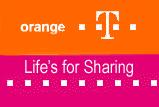Mark Bridge writes:
It’s the telecoms industry deal of the year. T-Mobile and Orange form a joint venture. The UK’s "big five" networks (or "big four", depending on your predilection for Hutchison 3G UK) will now be a "big four" (or "big three" if you don’t include 3. Confused yet?)
Everyone has an opinion. On Tuesday I was asked for mine by a journalist.
"What’ll it mean for consumers?" "Not much, really".
"Will it stifle innovation?" "Shouldn’t think so".
"Do you know anyone who’s a little more upbeat?" "I’ll get my coat".
On the positive side, the new company should enjoy improved coverage and reduced costs… although whether those reduced costs will be noticed by consumers is another matter. On the negative side there’ll be job losses, a glut in the second-hand base station market and less competition to keep prices down.
But, in the grand scheme of things, consumers probably won’t notice much difference. Not because I’m calling them unobservant in a Dixons-staff-on-Facebook kind of way – merely because most differences will either be pretty small or pretty slow-moving to anyone outside our industry.
The only big change will be the name. Some wags have already pointed out that "Orange T" would be Earl Grey (or perhaps pekoe), while cynics suggest that Orange already has its eye on taking over the partnership and will simply drop any reference to T-Mobile.
 Or will there be a new brand, complete with its own font and tone of voice. ("Curlz MT. Pantone 427. Write as though you’re taking to a mate, not an uneducated amoeba"). Will we be introduced to a completely new word – a Zavvi, a Blyk, a Google – that’ll be "powered by T-Mobile and Orange" and’ll have its own sparkly new internet domain?
Or will there be a new brand, complete with its own font and tone of voice. ("Curlz MT. Pantone 427. Write as though you’re taking to a mate, not an uneducated amoeba"). Will we be introduced to a completely new word – a Zavvi, a Blyk, a Google – that’ll be "powered by T-Mobile and Orange" and’ll have its own sparkly new internet domain?
Because that’s really all most people will notice. And that decision is a couple of years away. So, yes, the T-Mobile and Orange joint venture is a big deal. But, for most people, it’s not a Big Deal.